![FEMAManufacturedHousingUnitsTrailersMobileHomes[sic]ManufacturedHomeIndustryDailyBusinessNewsMHProNews](http://www.manufacturedhomepronews.com/wp-content/uploads/2017/11/FEMAManufacturedHousingUnitsTrailersMobileHomessicManufacturedHomeIndustryDailyBusinessNewsMHProNews-575x430.jpg)
That bit of forethought was never adopted.
A dozen years later, today the formal FEMA term “Manufactured Housing Unit” or MHU is the least common name used by the media and others.

There are literally are over one hundred thousand (100,000+) stories and posts involving “FEMA trailers,” [sic] over forty thousand that use the term, “FEMA mobile homes,” [sic] and as of this Daily Business News story, less than a thousand that use the proper and official name, FEMA Manufactured Housing Unit.
The fiasco of Katrina, and several other incidents have plagued the FEMA program from the vantage point of many in the industry.
Some have profited handsomely. But what some see is that the FEMA program has brought about an on again, off again series of incidents that act like a sore thumb stuck in the industry’s unjustly black eye.
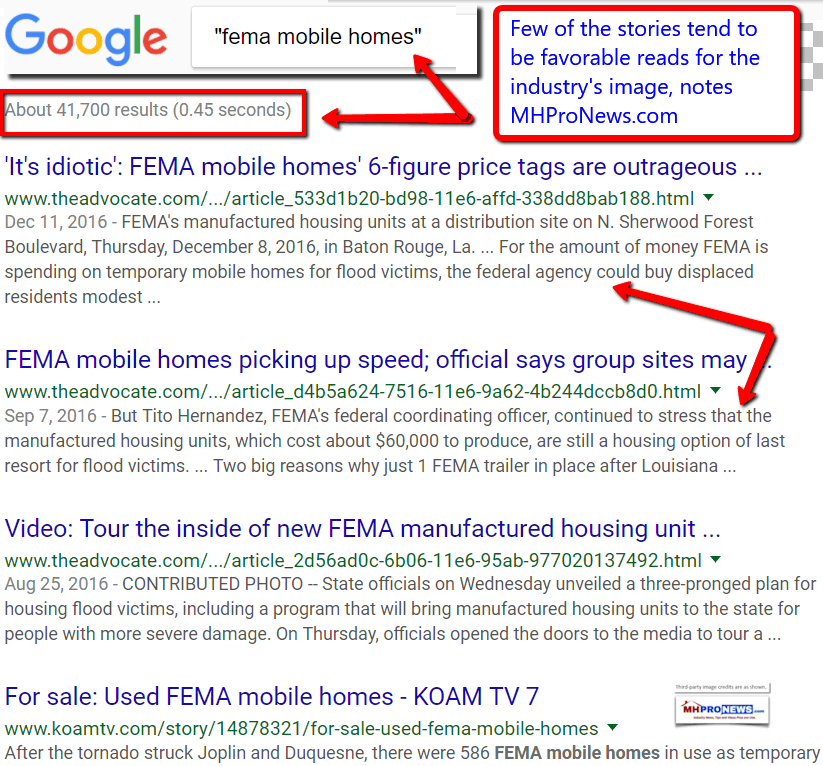
MHProNews, and others in the industry have since brought attention to the backlogs that are causing stress to retailers in the wake of Hurricane Harvey, and then Irma.
Reopening Factories for more HUD Code Manufactured Homes?
There are reports that in Florida, two idle plants may be re-opened, if and when labor and other issues can be successfully addressed.
In a wide cross section of the country, retailers and communities are told that their orders are “going to the back of the line,” as one source put it, due to FEMA’s orders, which MHProNews was the first to report.
The video below, which has Jim Ayotte from the Florida Manufactured Housing Association (FMHA) in it. The local news feature spotlights the problems in reporting by many in mainstream media. Several of the images they show are RVs, yet the dialogue they use is about manufactured homes (though – other than Ayotte – they use incorrect terminology in this video too). The need to educate media is clear, but the information in this video is important for the professional to be aware of too.
Louisiana
And now, in Louisiana, those FEMA units that were provided for the floods of August 2016 could come on the used home market. That per a new FEMA release to the Daily Business News, and also in the Advocate newspaper. The Advocate’s reporting was filled with the use of the term “trailer,” [sic] and “mobile homes” [sic].

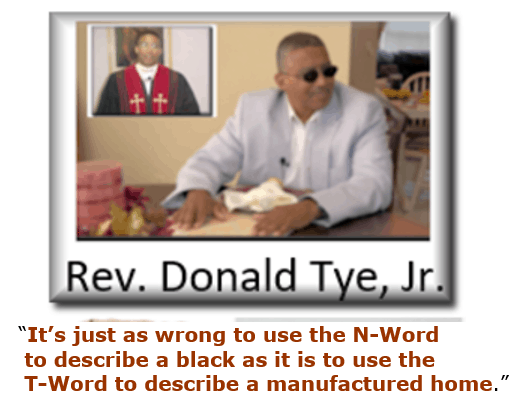
General Updates on FEMA
Some of those Louisiana FEMA homes placed in 2016 may end up being purchased by their occupants, but that comes with hoops to jump.
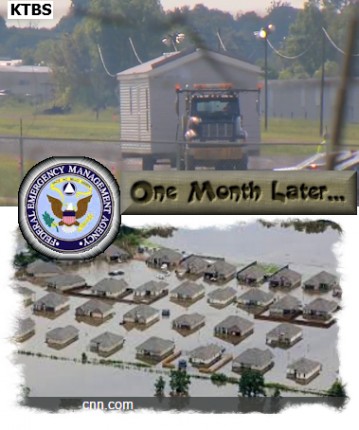
There are so many stories and reports involving FEMA and it impact on the industry, that MHProNews could in theory be doing only FEMA related reports.
That, the publisher has determined, would not serve the MH Industry’s need to be kept informed on other issues.
- This briefing is thus a quick update to relate that tens of thousands of FEMA units are said to be on order.
- Factories accepting the orders are struggling to keep up with all of the demand.
- Delivery dates to retailers and communities, per sources, are often well into the first quarter of 2018.
- There’s increased demand for transporters.
- The list goes on for supplies, and components.
Business and Consumer Impact
Retailers are attempting to keep customers happy on ordered homes.
Online posts by customers awaiting homes are often negative complaints, expressing to others their disappointment, frustrations, costs and other concerns about delays. Some social media posts complain that they’ve been allegedly deceived.
In fact, retailers and communities may be relating exactly what the plants are telling them. But with demand for supplies rising too, labor, and other wrinkles, its like a perfect storm…
…and FEMA is in several ways at the heart of those human storms in the wake of the 2017 storms of nature.
Labor, Other Challenges
Construction workers are at a premium. Cavco in their latest quarterly report noted that they are paying workers more post-hurricane season, and other producers have told MHProNews similarly.
The reason? The demand for consecution workers is so high, factories provide potential ‘poaching grounds’ for contractors seeking skilled workers.
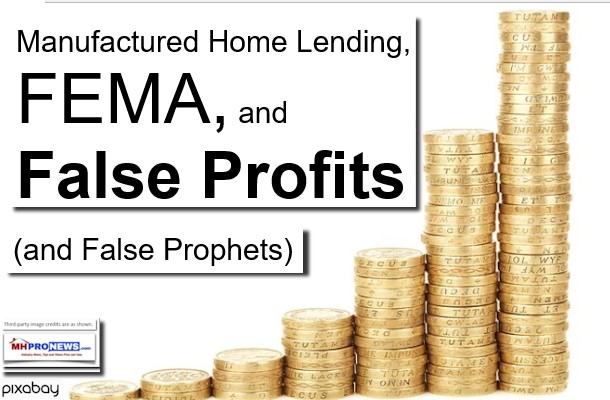
While some have made millions from FEMA, the bottom line take-away could be that FEMA has proven to be at best a mixed blessing to manufactured housing in general.
At worst it is part of what Marty Lavin has sarcastically called the industry’s other image campaign.
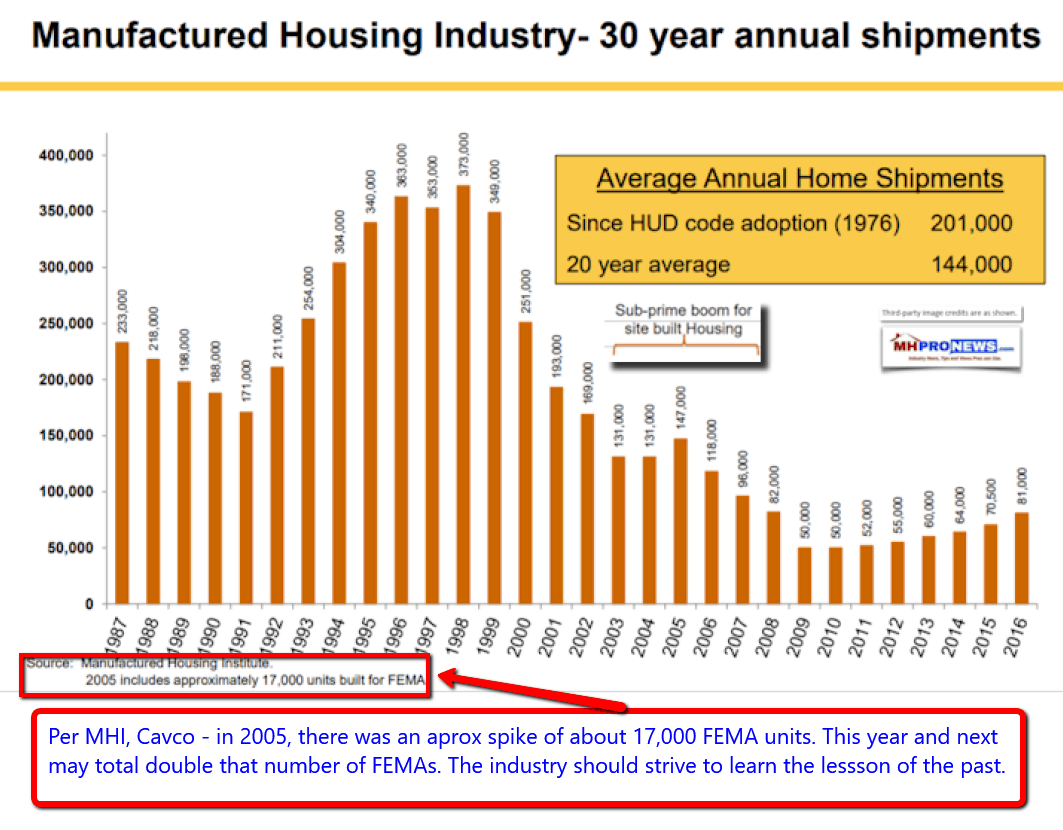
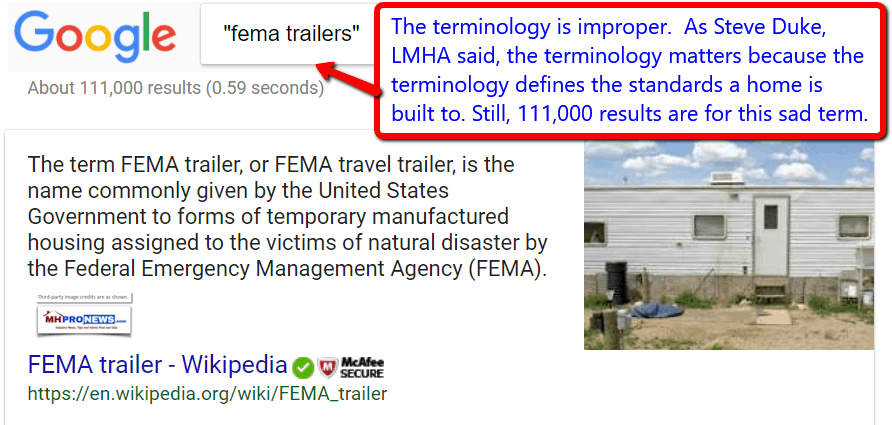
Links to prior reports related to FEMA follow this article, below. “We Provide, You Decide.” © ## (News, analysis, commentary.)
How Many Manufactured Housing Units Will FEMA Use? Disastrous Opportunities, Knock
FEMA, Clayton Growing “Threat” to Independent “Non-Corporate” Companies – from Omaha
Report – Memo Confirms FEMA Can ‘Take Over’ Manufactured Housing Production
Industry Voices
” I expect that all manufacturers, while agreeing with The Stafford Act, believe there is a much better way. Respect for the taxpayer certainly does not appear considered with many government purchases.
Industry Voices
Many of us can remember Katrina and tracking down houses that were abandoned at a truck stop or on the side of the highway, en route because the driver could make so much more money pulling for FEMA “right now.” There is legitimate reason for concern.
News tips – as well as commentary, documents, etc. – regarding FEMA, other issues are welcomed.


(Image credits are as shown above, and when provided by third parties, are shared under fair use guidelines.)


























